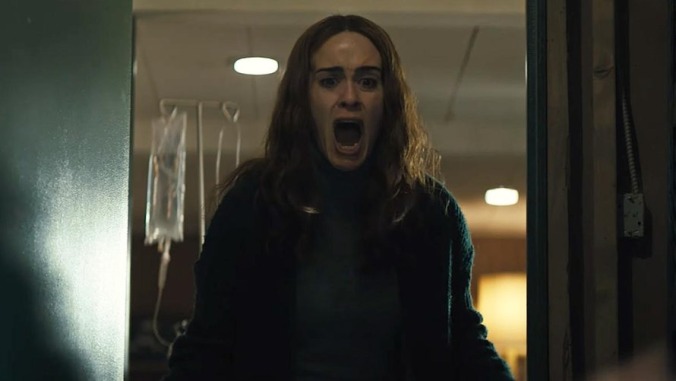In Run, helicopter parenting reaches a whole new level of unhinged. Likely taking cues from the real-life Munchausen-by-proxy case of Gypsy Rose Blanchard, writer-director Aneesh Chaganty’s second feature makes mommy dearest a formidable foe against teenage dreams of independence. Contrary to what it looks like, single mother Diane Sherman (Sarah Paulson) has no intention of letting her chronically ill 17-year old daughter, Chloe (newcomer Kiera Allen), fly the coop once college acceptance letters come around. This realization strikes early on, unfurling a series of increasingly berserk revelations about Chloe’s origins and upbringing. A psychological thriller with frustratingly little to say about the trenches of the human mind, Run nevertheless satisfies as a taut and titillating get-out movie that lands somewhere between HBO’s Sharp Objects and Whatever Happened To Baby Jane?
“Will she be okay?” asks a deeply distressed Diane while looking at her grey and diminutive newborn in the film’s harrowing opening sequence. Cinematographer Hillary Spera douses the moment in a sickly green, an atmosphere of rot that foreshadows the child’s various maladies. A title card reveals that Chloe suffers from a mouthful of conditions—arrhythmia, hemochromatosis, asthma, diabetes, paralysis—and in the present, we see the homeschooled teenager, who uses a wheelchair, run through a typical daily regimen of pills, ointments, and restrictions.
Forbidden from browsing the internet, our gentle heroine leads an intellectual life dedicated to book reading and devising small-scale engineering projects in her room. She’s desperate to hear back from the University Of Washington regarding her admission, and rushes to the door each time her mother arrives with the mail. Chocolate candies also make her tick, though she’s not allowed them in excess. It’s while sneaking a handful of these treats into her pocket that she notices something odd in the grocery bag—medication with Diane’s name on the label and pills inside that look awfully familiar.
At this point, Chaganty cranks up the intensity and never pulls back. With each obstacle that appears blocking her path to the truth, Chloe grows increasingly more suspicious—and frightened—of her mother, who seems to have diligently pre-empted her snooping. Nervous but fiercely determined, Chloe eludes her in necessarily innovative ways considering her many handicaps, while Diane threatens to appear at any moment with her sedative syringe. Chaganty continues to show a knack for crafting white-knuckle thrills from the simplest of raw materials, orchestrating a fast-paced succession of twists and beat-the-clock getaways that keep tensions high, even when the beats feel overly familiar. But Run lacks the inventiveness of Searching, his 2018 debut, which offered a fresh spin on the old-fashioned missing-person movie by having the story play out entirely on computer screens and smartphones. Here, the director effectively executes another tried-and-true suspense template, but does so without offering many new ideas of his own.
While Chloe is certainly sheltered beyond what’s reasonable, Diane’s neurotic parenting choices initially seem to come from a place of natural fear and anxiety. A veteran at playing cartoonish loony types on American Horror Story—and, more recently, Ratched—Paulson here expertly modulates her character’s parental agitation into something progressively more manic and unhinged. Her performance is stirring not because she flips the switch to pure villainy so effortlessly, but because when she does, it feels like a natural extension of a pathetic and broken pathology. Yet Chaganty and co-writer Sev Ohanian never bother digging any deeper. The trauma of losing, or nearly losing, a child merely hovers over the intrigue. Meanwhile, Chloe’s reality crumbles too abruptly as the direct result of a chance discovery. One is hard-pressed to believe that such a perceptive young woman would go so many years without detecting foul play. Rather than tease out the abuse and horror of life under a crazy guardian’s iron fist, the writers make the mother and daughter BFFs whose relationship suddenly turns sour at the first hint of deception. Ultimately, Run privileges shocks and increasingly outrageous drama at the expense of its characters.
This impulse isn’t entirely misguided. Whether Chaganty intended to lean into the campy psychosis of B-movie fare or not, Run’s disturbing qualities are matched by its delectable, occasionally hilarious outlandishness—a crawling rooftop getaway, an innocent casualty, an armed showdown at the hospital. As a psycho thriller, it’s a far cry from the full package, but Chaganty’s willingness to go off the deep end is a captivating reprieve from the austerity and self-seriousness that dominates the genre these days.











![HBO teases new Euphoria, Larry David, and much more in 2026 sizzle reel [Updated]](https://img.pastemagazine.com/wp-content/avuploads/2025/12/12100344/MixCollage-12-Dec-2025-09-56-AM-9137.jpg)





























